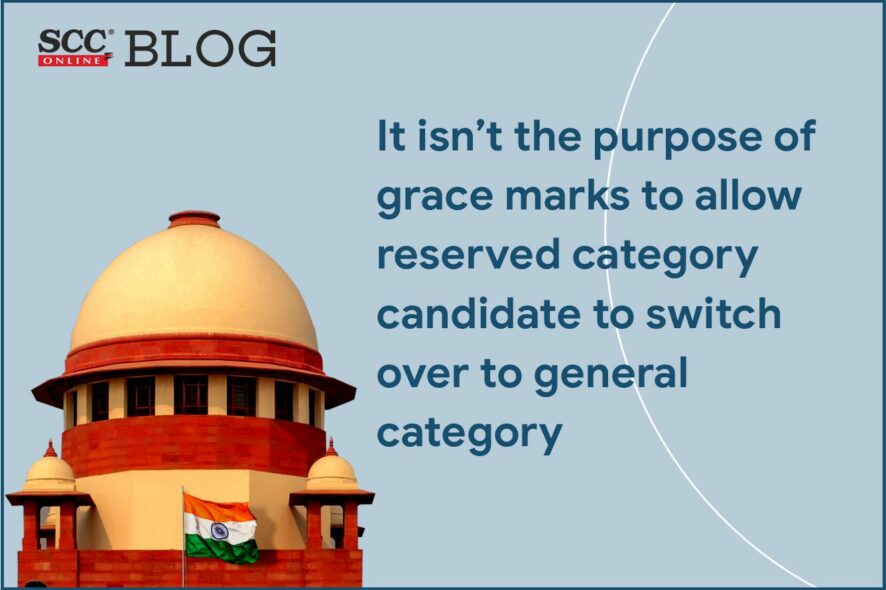Supreme Court: The Division Bench of M.R. Shah* and B.V. Nagarathna, JJ., reversed the impugned order of the Rajasthan High Court whereby the High Court had directed Income Tax Department to grant grace marks to the applicant and treat him as a person belonging to general category.
Restoring the findings of the Central Administrative Tribunal, the Court held that the CBDT had introduced a grace marks policy to enable marginally failing candidates to pass the examination and the purpose of benefit was not to allow the reserved category candidate to switch over to the general category. The Court held,
“…once the respondent – original applicant passed in his own category, there was no question of allowing/granting him any further grace marks.”
Background
The original applicant, who belonged to the Scheduled Tribes (ST) category, was working as a lower Division Clerk in the Department of Income Tax. Later on, he was promoted to the posts of Tax Assistant, Sr. Tax Assistant and Office Superintendent.
With a view to regulate the departmental examination for Income Tax Inspectors, the competent authority introduced modified rules for Departmental Examination for Income Tax Inspectors – 1998. As per the modifications, a candidate securing a minimum of 45% marks in five subjects except in Hindi was entitled to be declared as pass. For the members of SCs and STs, the minimum qualifying mark was 40%. Further, for the benefit of those candidates who marginally failed to secure minimum marks, irrespective of their category, on falling short of passing up to five marks, the Central Board of Direct Taxes (CBDT) introduced the policy of awarding grace marks.
It was the case of the original applicant that he had secured more than 45% marks in each subject except the subject of “Other Taxes”. Hence, he was entitled to grace marks in the subject of “Other Taxes”, but the same was not given to him as he was treated qualified in the category of Scheduled Tribes. The applicant contended that since he had got 43 marks in “Other Taxes” had he been given two grace marks, he would have been declared eligible for promotion against general vacancies.
Findings of the Tribunal and the High Court
The Tribunal, by a reasoned and detailed judgment and order, dismissed the application preferred by the applicant by observing that the CBDT circular providing grace marks cannot be interpreted to mean that a person, who has passed in his own category can be given further grace marks to enable him to move in the general category on his own merit.
However, the said order was reversed by the High Court of Judicature for Rajasthan at Jodhpur. The High Court had directed the Income Tax Department to extend the grace marks to the applicant in the subject of “Other Taxes” by treating him as a person belonging to general category.
Analysis and Conclusion
Observing that the CBDT had introduced the grace marks policy with the purpose of enabling the marginally failing candidates to pass in the examination, the Court opined that once the respondent – original applicant passed in his own category, there was no question of allowing/granting him any further grace marks.
The Court explained that only in a case where any candidate belonging to any category is marginally failing to pass the examination, he is/was to be allowed the grace marks so as to allow him to obtain the minimum passing marks required and that too by allowing up to five grace marks.
Therefore, the Court opined that the Tribunal had rightly not accepted the arguments of the applicant. Further, the Court held that the High Court, while passing the impugned judgment and order, had not at all appreciated and/or considered in its true spirit the object and purpose of grace marks policy introduced by CBDT.
Consequently, the impugned judgment and order were quashed and set aside. The judgment and order passed by the Tribunal dismissing the O.A. was restored.
[Union of India v. Mukesh Kumar Meena, 2022 SCC OnLine SC 525, decided on 28-04-2022]
*Judgment by: Justice M.R. Shah
Appearance by:
For Union of India: Advocate Nachiketa Joshi
For the Applicant: Advocate Sumant Bhardwaj
Kamini Sharma, Editorial Assistant has put this report together






